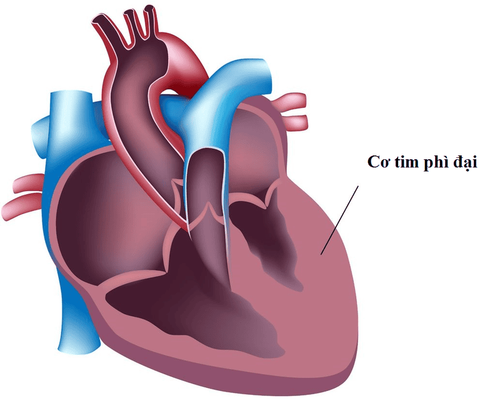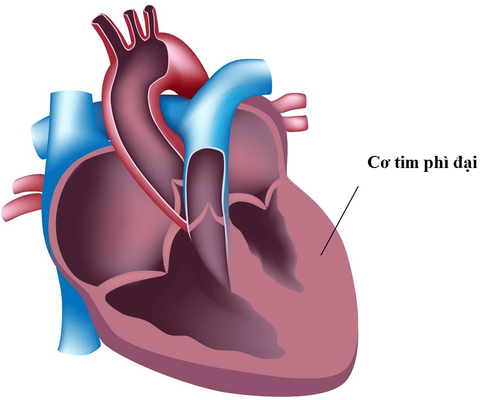This is an automatically translated article.
The article was consulted with a doctor of Radiology, Department of Diagnostic Imaging - Vinmec Central Park International General Hospital.The EF is a typical parameter that often appears in the results of echocardiographic techniques. This is a very important indicator, contributing to the assessment of the pumping function of the heart. Based on the results of this index, doctors can make accurate diagnoses about cardiovascular diseases that patients are suffering from.
1. What is the EF index in echocardiography?
EF stands for Ejection Fraction, which means ejection fraction, is an index used to evaluate the heart's ability to pump blood, corresponding to the two main chambers of the heart, the right and left ventricle. In medicine, this index is divided into 2 ejection fractions:
Right ventricular ejection fraction (RVEF), which represents the ratio of the amount of blood pumped out of the right ventricle and into the artery. lungs during each contraction of the heart. Left ventricular ejection fraction (LVEF), which is the ratio of the amount of blood that is pumped out of the left ventricle and into the inferior artery and superior aorta during each contraction of the heart. But now, in diagnosis and treatment, most of the cases people often refer to the left ventricular ejection fraction index. And echocardiography is an important and indispensable technique to help doctors accurately measure the patient's ejection fraction.
In addition, other techniques such as magnetic resonance imaging (MRI), X-ray, CT scan, or radioisotope scanning, are also commonly used to determine the ejection fraction of the heart of a patient. patient.

Chỉ số EF trong kỹ thuật siêu âm tim là phân suất tống máu
2. What are the normal/abnormal values of EF in echocardiography?
The main function of the heart is to pump blood to nourish our entire body. And the heart will pump blood according to each programmed cycle, with the pumped blood flow must be large enough to ensure the body can function normally. But if for some reason the pumping power of the heart shows signs of change, it proves that the function of the body's organ systems is also affected, these factors will all be evaluated. Evaluation is based on the significance of the EF index in echocardiography.
The EF index plays an important role in accurately reflecting the dysfunction of the systolic function in the body of patients with cardiovascular diseases.
Normally, in healthy people, the EF index usually ranges from 50-70%, this is considered an ideal value for the heart's pumping power, then the heart will supply a large amount of blood. a certain amount of blood, just enough for the entire needs of the body.
If the results of the echocardiogram show that the patient's ejection fraction is changed, the doctors will quickly find the cause and make accurate judgments about the patient's cardiovascular health. patient.

Chỉ số EF ở người khỏe mạnh thường dao động trong khoảng từ 50-70%
When the results show that the patient's ejection fraction is above 75%, it means that the patient is suffering from diseases such as hypertrophic cardiomyopathy, which causes the heart's pumping process to spike. This syndrome is characterized by abnormal growth of the heart muscle fibers, thereby causing the wall of the heart to thicken, especially in the right and left ventricles. This seriously affects the volume of the chambers of the heart, causing the area to be significantly reduced, and with it the rate of blood being pumped out of the heart increases while the amount of blood being pumped back is relatively small.
If the results show that the patient's ejection fraction is decreasing, below 50%, this is a sign that the pumping function of the heart is impaired, and the patient's heart is no longer able to function properly. capacity to pump enough blood for all the body's needs. This is one of the typical signs of patients with heart failure.
3. Abnormal EF indicates cardiovascular disease
Low ejection fraction index is a warning of heart failure, then the patient will experience typical symptoms such as:
Swelling, edema in the feet and legs: this is a sign of heart failure. Peripheral fluid retention because the patient's heart does not have enough capacity to return blood from the great circulation. Frequent shortness of breath when performing light labor tasks, or doing housework. If the heart failure is more advanced, the patient may feel short of breath even at rest. Fatigue: This is one of the earliest signs of heart failure and is also the most common. Abnormally fast heart rate: occurs when the heart begins to pump more forcefully to compensate for the lack of blood.

Bệnh nhân có chỉ số phân suất tống máu EF thấp sẽ thường xuyên khó thở
4. Some things to keep in mind when ejection fraction declines
If the ejection fraction is impaired, depending on the severity, the specialist will give appropriate advice to improve the EF:
Salt restriction: to improve the condition. With impaired cardiac function, patients should limit the amount of salt entering the body, to prevent fluid from entering with salt, to avoid stagnation of fluid in the circulatory system and thereby reduce the burden. for the heart. Limit the amount of fluid entering the body. Regular exercise: contributes to improving cardiovascular health and improves EF very effectively. It can be said that the EF index has a very important meaning in the prognosis and evaluation of the treatment effectiveness of heart failure. Therefore, if your body shows any related symptoms, you should immediately go to the nearest medical facility for timely examination and treatment.
To protect cardiovascular health in general and detect early signs of cardiovascular disease, customers can sign up for Cardiovascular Screening Package - Basic Cardiovascular Examination of Vinmec International General Hospital. The examination package helps to detect cardiovascular problems at the earliest through tests and modern imaging methods. The package is for all ages, genders and is especially essential for people with risk factors for cardiovascular disease.
Please dial HOTLINE for more information or register for an appointment HERE. Download MyVinmec app to make appointments faster and to manage your bookings easily.













